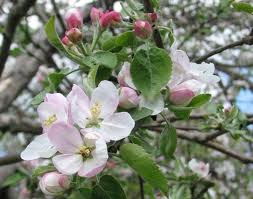Few Fruits On Fruit Trees
 Question from Robin:
Question from Robin:
Quick question: I have almost zero fruit on my all my fruit trees this year. There were loads of blossoms in March and then the hail and cold snap seemed to strip the trees. What can be done to encourage re-bloom on the apples. And is there anyway to intensify the sweetness of fruit on apples, peaches etc. Thanks as always, RC
Answer from Pat:
Re-bloom on low-chill apple trees, such as Anna, is a result of temperature. However, on espaliered apple trees, if you reduce the number of spurs by cutting down the length of the laterals that are growing like water sprouts straight up from the branches and getting rather too tall, this cutting back when done in summer, can result almost immediately in the remaining spurs lower down bursting into bloom. Make sure those flowers are pollinated or there will be no fruit. If you know what a spur looks like on your tree you could try clipping an inch or two with one or two buds off the top of a spur. Thus you could see if this produced bloom. If it did, you could then clip several spurs this way thus forcing other buds lower down to bloom. You would need to pollinate the blooms unless there were plenty of bees. In this way you could get fruit started in the warm summer months whenever you wanted that would ripen later in the year. It is the same principle as keeping a wisteria in bloom as I do by cutting back all the twiners throughout summer. I cut them back in summer to create more spur wood for spring bloom and to control the growth of the vine do it doesn’t become a rat’s nest of growth, but the bonus is all these flowers I get throughout summer.
The reason you had too little fruit on your trees this year most likely came from lack of bees to pollinate the flowers. Just today I answered another query to this blog on a similar question about plum trees. Your low chill apple tree, if it is an Anna needs a pollinator, another apple tree such as Ein Shemer with which its pollen can be mixed by bees. But even if there is no apple tree close enough to act as pollinator, your tree still needs to have its pollen transferred from the male part of the flower to the female part in order to bear fruit. Without cross pollination, the fruit will be narrow in shape and have few seeds but you will still have fruit. Thus your problem with lack of fruit most likely resulted from lack of bees to do this pollination. You can see why I don’t ever recommend that people thin out the blossoms on their fruit trees. We need all the blossoms we can get in order to have plenty of pollen to pollinate the flowers that will turn into fruit.
Rain and cold temperatures sometimes keep bees in their hives. Spraying with chemicals when there are flowers on the tree is a bad practice since sprays kill bees. Bees pollinate the flowers on a self-fruitful tree by going from flower to flower all over the tree. Cross pollination occurs when the bees visit various trees and mix the pollen from tree to tree. Next year if you see no bees, get a sable brush and go from flower to flower swirling the brush inside individual flowers here and there all over the tree and also back and forth to your pollinator tree or collect some pollen from it so you can mix the pollen more easily. You should then get fruit! Do the job in the morning after the dew has dried but while the pollen is still fresh and keep it up for several days doing some flowers every day. The more flowers you pollinate the more fruit you will get.
Regarding intensifying the sweetness of apples, the main thing is to choose a good sweet variety in the first place. Next, it is up to the weather where you live and there is not much the gardener can do about it. Cold nights and hot sunny days make for sweet apples. Some people swear their apples taste differently depending on what they feed the trees, manure being the main ingredient for the people who believe this. I did once know a gardener who lived next door to a horse pasture on top of a mesa near the ocean and he covered the ground under all his fruit trees with horse manure in midwinter after leaves dropped in fall. He raised good fruit crops of several varieties. I am not totally convinced that fertilizer does it, most likely variety and root stock really helps, but i am convinced that feeding with too much synthetic fertilizer can lead to tasteless fruit, since I’ve eaten some grown that way. The best example was just down the street from the guy with the horse next door. Finally, the best fruit is tree-ripened all the way and not picked too early, even if there are raccoons and birds who might get your fruit first.

